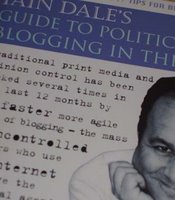 Despite my previous posts, Iain Dale had a topic other than blogging to discuss. His new venture, "Britain's first political Internet TV Channel", began broadcasting on October 10.
Despite my previous posts, Iain Dale had a topic other than blogging to discuss. His new venture, "Britain's first political Internet TV Channel", began broadcasting on October 10.
18 Doughty Street's launch comes at a time when "those who want to have intelligent political debate are not getting it in the mainstream media," says Dale.
According to the 18 Doughty Street 'About' page, "It aims to break the mould of current affairs television with a mix of opinionated and controversial programming."
Having watched the programme, I didn't think it especially controversial. Opinionated, sure - but is that controversial in itself?
British broadcasting has traditionally been bound by rules on impartiality and, by broadcasting on the net, Dale and his colleagues at 18 Doughty Street have circumnavigated this regulation. It's innovative, yes, but newspapers in the UK don’t claim to be completely impartial, so is the idea of a broadcaster who doesn’t really that shocking?
Maybe it’s true that people are turning away from traditional political broadcasting because constraints of balance make programmes staid. Perhaps 18 Doughty Street, and other programmes that will surely follow it, will go some way to addressing the prevailing opinion among apathetic voters that politics is dull. But it’s interesting that Dale cites one of the main ways they will achieve this as being unrestricted scheduling. Politicians and others taking part in 18 Doughty Street’s heated debates will not “be cut off just as things are getting interesting”.
As we heard from Amanda Powell, web users are impatient. If, as according to this (now rather old)
BBC article, users spend less than 60 seconds at an average site, who's to say viewers will even get as far as the interesting part?

 James Hrynyshyn is a freelance science journalist based in North Carolina, USA. The Island of Doubt is his ScienceBlog, in which he discusses current scientific and ecological issues and, in particular, their representation in the media.
James Hrynyshyn is a freelance science journalist based in North Carolina, USA. The Island of Doubt is his ScienceBlog, in which he discusses current scientific and ecological issues and, in particular, their representation in the media.




